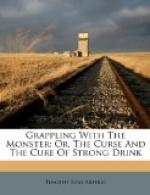Meantime, the bitter, half-despairing cry, “O Lord, how long!” was going up from the lips of brokenhearted wives and mothers all over the land, and year by year this cry grew deeper and more desperate. All hope in man was failing from their hearts. They saw restrictive legislation here and there, and even prohibition; but, except in a few cases, no removal of the curse; for behind law, usage, prejudice, interest and appetite the traffic stood intrenched and held its seat of power.
At last, in the waning years of the first century of our nation’s existence, their failing hope in man died utterly, and with another and deeper and more despairing cry, the women of our land sent up their voices to God. Not now saying “O Lord, how long!” but “Lord, come to our help against the mighty!”
What followed is history. The first result of this utter abandonment of all hope in moral suasion or legal force, and of a turning to God in prayer and faith, was that strange, intense, impulsive movement known as the “Woman’s Crusade.”
BEGINNING OF THE CRUSADE.
Let us briefly give the story of its initiation late in the month of December, 1873. Dr. Dio Lewis, in a lecture which he had been engaged to deliver at Hillsboro, Ohio, related how, forty years before, his pious mother, the wife of a drunkard, who was struggling to feed, clothe and educate her five helpless children, went, with other women who had a similar sorrow with her own, to the tavern-keeper who sold their husbands drink, and, kneeling down in his bar-room, prayed with and for him, and besought him to abandon a business that was cursing his neighbors and bringing want and suffering into their homes. Their prayers and entreaties prevailed. After telling this story of his mother, the lecturer asked all the women present who were willing to follow her example to rise, and in response, nearly the entire audience arose. A meeting was then called for the next morning, to be held in the Presbyterian church.
Dr. Lewis was a guest at the old mansion of Ex-Governor Trimble, father of Mrs. E.J. Thompson, a most cultivated, devoted Christian woman, mother of eight children. She was not present at the lecture, but “prepared,” as she writes, “as those who watch for the morning, for the first gray light upon this dark night of sorrow. Few comments were made in our house,” she continues, “upon this new line of policy until after breakfast the next morning, when, just as we gathered about the hearth-stone, my daughter Mary said, very gently: ’Mother, will you go the meeting this morning?’ Hesitatingly I replied: ’I don’t know yet what I shall do.’ My husband, fully appreciating the responsibility of the moment, said: ’Children, let us leave your mother alone; for you know where she goes with all vexed questions;’ and pointing to the old family Bible, left the room. The awful responsibility of the step that I must needs




